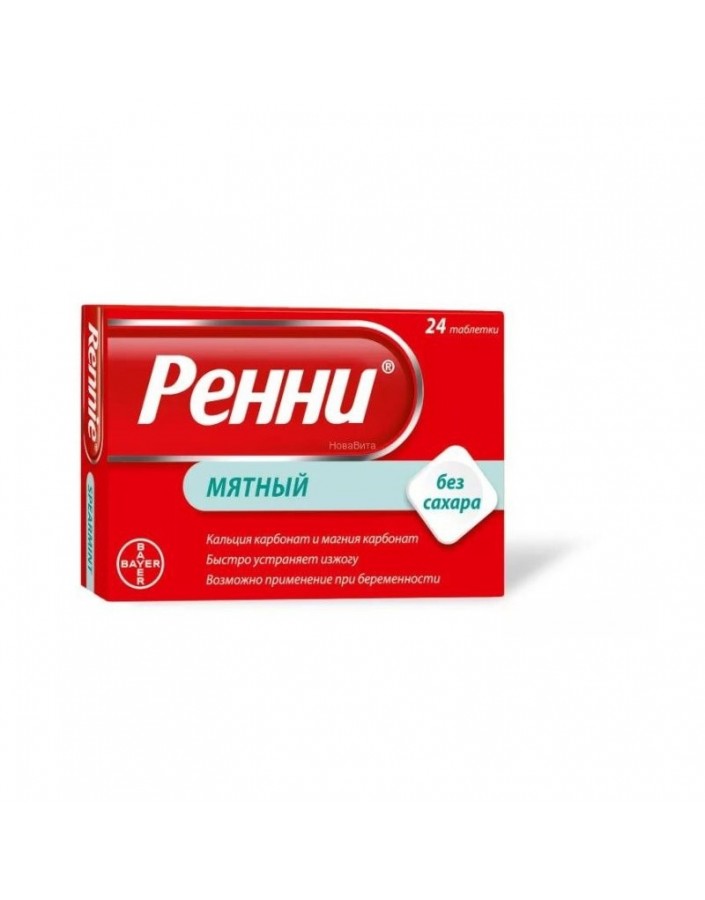




Security policy (edit with Customer reassurance module)

Delivery policy (edit with Customer reassurance module)

Return policy (edit with Customer reassurance module)
Rennie
Calcium carbonate + Magnesium carbonate
Chewable pills without sugar [mint], chewable pills without sugar [cooling taste].
White with a creamy shade square pills with concave surfaces, engraved with "RENNIE" on both sides, with the smell of mint. The presence of light cream spots (for chewable sugar-free pills [cooling flavor]) is allowed.
1 pill chewable without sugar [mint] contains
Active ingredients: Calcium carbonate 680 mg, magnesium hydroxycarbonate 80 mg.
Excipients: sorbitol 400 mg, pregelatinized corn starch 20 mg, potato starch 13 mg, talc 35.5 mg, magnesium stearate 10.7 mg, liquid paraffin 5 mg, mint flavor 10 mg, sodium saccharinate 800 μg.
1 sugar free chewable pill [cooling flavor] contains
Active ingredients: calcium carbonate 680 mg, magnesium hydroxycarbonate 80 mg.
Excipients: sorbitol 400 mg, pregelatinized corn starch 20 mg, potato starch 13 mg, talc 35.5 mg, magnesium stearate 10.7 mg, liquid paraffin 5 mg, cooling flavor 15 mg, mint flavor 8 mg, sodium saccharinate 800 μg.
Antacid.
Pharmacodynamics. Antacid preparation of local action. Renny® pill contains antacid substances - calcium carbonate and magnesium carbonate, which provides fast and long-lasting neutralization of excess hydrochloric acid of the gastric juice, thereby exerting a protective effect on the gastric mucosa. Achieving a positive effect within 3-5 minutes due to the good solubility of pills and high calcium content.
Pharmacokinetics. As a result of the interaction of Renny® with gastric juice, soluble calcium and magnesium salts are formed in the stomach. The degree of absorption of calcium and magnesium from these compounds depends on the dose of the drug. The maximum absorption is 10% calcium and 15-20% magnesium. A small amount of absorbed calcium and magnesium is excreted through the kidneys. When kidney damage, plasma and calcium concentrations may increase. In the intestine of soluble salts are formed insoluble compounds that are excreted in the feces.
Symptoms associated with increased acidity of gastric juice and reflux esophagitis: heartburn, sour eructation, recurrent pain in the stomach, feeling of fullness or heaviness in the epigastric region, dyspepsia (including caused by an error in diet, medication, alcohol abuse, coffee, nicotine), dyspepsia of pregnant women.
Severe renal failure, hypercalcemia, hypophosphatemia, nephrocalcinosis, hypersensitivity to the drug, children up to 12 years of age.
When used in recommended doses, the drug does not pose a danger to the fetus or child.
Inside Adults and children over 12 years old: unless otherwise recommended by a doctor, chew 1-2 pills when symptoms appear or chew in the mouth until completely dissolved. If necessary, you can repeat the drug after 2 hours.
The maximum daily dose is 11 tablets.
If the recommended doses are observed, the drug is well tolerated, however, allergic reactions are possible: rash, angioedema, Anaphylactic reactions.
Prolonged use of the drug in high doses in patients with impaired renal function can cause hypermagnesemia, hypercalcemia, alkalosis, which can manifest nausea, vomiting, muscle weakness. In this case, you should cancel the drug and immediately contact your doctor.
Changes in the acidity of gastric juice, during the use of antacids, can lead to a decrease in the rate and extent of absorption of other drugs, while taking it, so drugs should be taken 1-2 hours before or after taking antacids.
Tetracycline antibiotics, fluoroquinolones, cardiac glycosides, levothyroxine, iron preparations, fluorides, phosphates - while the use of antacids reduces the absorption of these drugs.
Thiazide diuretics - when taken concurrently with antacids, the concentration of calcium in blood serum should be regularly monitored.
In the appointment of the drug to patients with impaired renal function should regularly monitor the concentration of magnesium, phosphorus and calcium in the serum.
Patients with impaired renal function is not recommended to take the drug for a long time in high doses.
The use of Renny® in high doses may increase the risk of kidney stones.
1 pill Renny® contains 400 mg of sorbitol and can be used by patients with diabetes. If the use of the drug is ineffective, you should contact your doctor for advice.
Does not affect.
Chewable pills without sugar [mint].
Chewable pills without sugar [cooling taste].
2 pills in PET / Aluminum / PE strip. On 18 strips together with the application instruction in a cardboard pack.
On 6 pills in a thermowelled aluminum / PVC blister. On 2, 4, 6, 8 and 16 blisters together with the application instruction in a cardboard pack.
On 12 pills in a thermowelled aluminum / PVC blister. On 1, 2, 3, 4 and 8 blisters together with the application instruction in a cardboard pack.
Store at a temperature not higher than 25 ° С. Keep out of the reach of children.
Chewable pills without sugar [mint], chewable pills without sugar [cooling taste] (blister): 3 years.
Chewable pills without sugar [cooling flavor] (strip): 2 years.
Do not use after expiration date.
Over the counter.